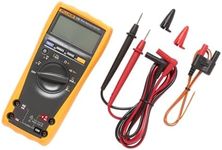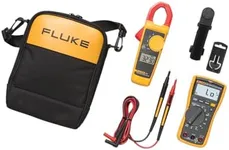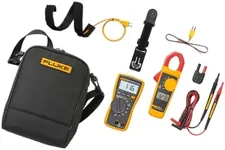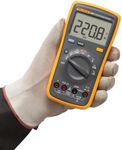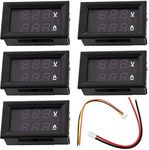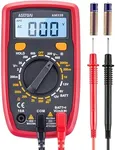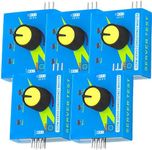Buying Guide for the Best Multimeters
Choosing the right multimeter can be a bit overwhelming, but with a little guidance, you can find the perfect one for your needs. A multimeter is an essential tool for anyone working with electrical circuits, whether you're a professional electrician, a hobbyist, or a DIY enthusiast. It measures voltage, current, and resistance, and can help you troubleshoot electrical problems. To pick the best multimeter for you, consider the following key specifications and how they align with your specific needs.AccuracyAccuracy refers to how close the multimeter's readings are to the actual values. This is important because precise measurements are crucial for diagnosing and fixing electrical issues. Accuracy is usually expressed as a percentage. For general use, an accuracy of ±1% is often sufficient. For more critical applications, such as in a laboratory or for professional use, you might need a multimeter with an accuracy of ±0.5% or better. Consider what level of precision you need based on the tasks you'll be performing.
RangeThe range of a multimeter indicates the maximum and minimum values it can measure for voltage, current, and resistance. This is important because it determines the scope of tasks you can perform with the device. Multimeters can be manual or auto-ranging. Manual-ranging multimeters require you to set the range yourself, which can be less convenient but may offer more control. Auto-ranging multimeters automatically select the appropriate range, making them easier to use, especially for beginners. Think about the types of measurements you'll be taking and choose a multimeter with ranges that cover those needs.
DisplayThe display of a multimeter shows the measurement readings. A clear and easy-to-read display is crucial for accurate data interpretation. Displays can be analog or digital. Analog displays use a needle and scale, which can be harder to read but are preferred by some for their responsiveness. Digital displays show readings as numbers, which are easier to read and often more precise. Some digital multimeters also have backlit displays, making them easier to read in low-light conditions. Consider where and how you'll be using the multimeter to decide which type of display is best for you.
Input ImpedanceInput impedance is the resistance the multimeter presents to the circuit being measured. High input impedance is important because it ensures that the multimeter does not affect the circuit's operation. This is particularly crucial when measuring sensitive electronics. Most modern digital multimeters have a high input impedance (typically 10 megaohms or higher), which is suitable for most applications. If you work with very sensitive or high-precision electronics, ensure your multimeter has a sufficiently high input impedance.
Safety RatingsSafety ratings indicate the maximum voltage the multimeter can safely measure and the environments in which it can be used. This is important to prevent accidents and ensure your safety while using the device. Look for multimeters with CAT (Category) ratings, which range from CAT I to CAT IV. CAT I is for low-energy circuits, while CAT IV is for high-energy circuits like those found in industrial settings. Choose a multimeter with a safety rating appropriate for the types of electrical systems you'll be working with.
Additional FeaturesAdditional features can enhance the functionality and convenience of a multimeter. Common features include continuity testing, diode testing, temperature measurement, and data hold functions. These features can be very useful depending on your specific needs. For example, continuity testing helps you check if a circuit is complete, while temperature measurement can be useful for HVAC work. Consider what additional features might be beneficial for your tasks and choose a multimeter that includes those capabilities.


